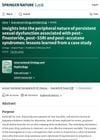21 citations,
December 2019 in “PloS one” The rat model showed early perimenopause with regular cycles and low hormones, and late perimenopause with irregular cycles and higher hormone levels.
 8 citations,
January 1987 in “Gynecological Endocrinology”
8 citations,
January 1987 in “Gynecological Endocrinology” Flutamide, an antiandrogen, has minimal impact on female rat endocrine systems and does not significantly change their reproductive cycles.
 30 citations,
January 2015 in “BioMed Research International”
30 citations,
January 2015 in “BioMed Research International” Continuous light exposure in rats leads to PCOS-like symptoms and suggests sleep habits might affect the disorder's development.
 6 citations,
December 2022 in “Frontiers in Pharmacology”
6 citations,
December 2022 in “Frontiers in Pharmacology” Quercetin may help improve symptoms of polycystic ovary syndrome.
16 citations,
January 2014 in “Obesity surgery” Vertical sleeve gastrectomy improved metabolism, behavior, and reproduction in obese rats with PCOS.
 1 citations,
June 2012 in “Springer eBooks”
1 citations,
June 2012 in “Springer eBooks” Acupuncture may improve reproductive and metabolic functions in PCOS without negative side effects, but more research is needed to confirm its effectiveness.
 December 2023 in “Research in pharmacy”
December 2023 in “Research in pharmacy” Phytotherapeutic compounds and supplements can help manage Polycystic Ovarian Syndrome (PCOS).
 2 citations,
November 2012 in “InTech eBooks”
2 citations,
November 2012 in “InTech eBooks” The document concludes that sex hormones are crucial for mammalian reproduction, health, and behavior, and require more research for therapeutic use.
 January 2015 in “Side effects of drugs annual”
January 2015 in “Side effects of drugs annual” The document concludes that sex hormones and related compounds have various effects on health, with both potential benefits and risks.
 41 citations,
September 2014 in “Journal of Pharmacy and Pharmacology”
41 citations,
September 2014 in “Journal of Pharmacy and Pharmacology” Melatonin may help treat PCOS symptoms in rats.
 24 citations,
May 2018 in “Journal of Molecular Endocrinology”
24 citations,
May 2018 in “Journal of Molecular Endocrinology” The spiny mouse is a unique menstruating rodent that can help us understand menstruation and reproductive disorders.
 6 citations,
February 2021 in “Journal of Ovarian Research”
6 citations,
February 2021 in “Journal of Ovarian Research” 150 kHz electromagnetic radiation might help improve PCOS in rats.
 158 citations,
May 1968 in “The journal of nutrition/The Journal of nutrition”
158 citations,
May 1968 in “The journal of nutrition/The Journal of nutrition” Zinc is crucial for growth and health in rats.
 116 citations,
April 2002 in “American journal of veterinary research”
116 citations,
April 2002 in “American journal of veterinary research” Trilostane effectively and safely treats dogs with pituitary-dependent hyperadrenocorticism, improving symptoms and adrenal gland size.
 37 citations,
January 1991 in “Reproductive Toxicology”
37 citations,
January 1991 in “Reproductive Toxicology” Finasteride reduces male rat fertility by causing issues with copulatory plug formation.
 35 citations,
October 2004 in “Biology of Reproduction”
35 citations,
October 2004 in “Biology of Reproduction” PNU157706 reduced rat sperm movement and fertility without affecting offspring health.
 19 citations,
June 2020 in “Animals”
19 citations,
June 2020 in “Animals” Poor maternal nutrition can lead to fewer wool follicles in Chinese Merino sheep.
 18 citations,
September 2018 in “Experimental physiology”
18 citations,
September 2018 in “Experimental physiology” Electro-acupuncture may help treat PCOS in rats by changing brain DNA methylation.
 16 citations,
May 2019 in “International Journal of Women's Dermatology”
16 citations,
May 2019 in “International Journal of Women's Dermatology” The new FDA labeling rules provide more detailed drug safety information for pregnant and breastfeeding women, but more data is needed on the risks of many dermatologic drugs.
 15 citations,
December 2016 in “Revista Da Associacao Medica Brasileira”
15 citations,
December 2016 in “Revista Da Associacao Medica Brasileira” Polycystic ovary syndrome is a common hormonal disorder in women, linked to increased risk of metabolic and heart diseases, and needs more research for better understanding and treatment.
 6 citations,
October 2018 in “Endocrinology”
6 citations,
October 2018 in “Endocrinology” Prenatally androgenized ewes can model increased hair diameter in women with PCOS.
 4 citations,
October 2022 in “Evidence-based complementary and alternative medicine”
4 citations,
October 2022 in “Evidence-based complementary and alternative medicine” Ficus carica extract improved fertility in rats and may help with certain health conditions.
 December 2023 in “Frontiers in endocrinology”
December 2023 in “Frontiers in endocrinology” Excess androgens may cause PCOS, not just be a symptom.

Accurate diagnosis and tailored treatments are crucial for managing hair loss in humans and animals.
 May 2024 in “Brain disorders”
May 2024 in “Brain disorders” Agmatine may help reduce seizures linked to hormone changes in female rats.
 36 citations,
October 2021 in “Frontiers in Endocrinology”
36 citations,
October 2021 in “Frontiers in Endocrinology” Insulin resistance and high male hormone levels are major causes of Polycystic Ovary Syndrome.
 55 citations,
May 2019 in “Journal of Endocrinology”
55 citations,
May 2019 in “Journal of Endocrinology” Androgens are important for female fertility and could help in IVF treatment, but also play a role in causing PCOS.
 9 citations,
February 2022 in “Genes”
9 citations,
February 2022 in “Genes” Women with PCOS have more Bifidobacterium in their gut compared to those without PCOS.
2 citations,
August 2021 in “Experimental and Therapeutic Medicine” Moxibustion may help improve ovarian function by changing androgen levels.
 February 2025 in “International Urology and Nephrology”
February 2025 in “International Urology and Nephrology” Peripheral treatments showed some improvement in sexual dysfunction, but central symptoms remain challenging.


























